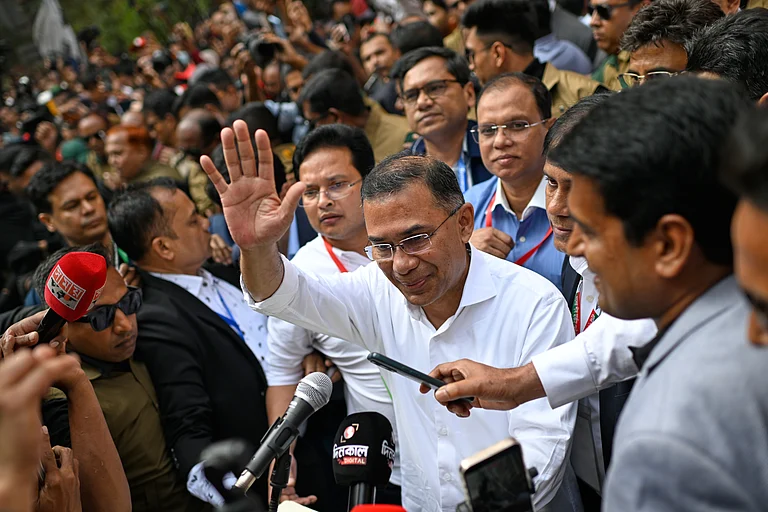The CBI on Friday raided the home of Delhi Deputy Chief Minister Manish Sisodia and 30 other locations in connection with alleged corruption in the implementation of the Delhi Excise Policy.
The AAP condemned the raids with Chief Minister Arvind Kejriwal claiming the agency has been "asked from above" to harass its leaders. The BJP asked the Delhi government to come out clean on its excise policy.
The 15-hour-long searches at the AAP leader's home, the residence of IAS officer and former excise commissioner Arava Gopi Krishna and 29 other places took place after the CBI registered an FIR for alleged corruption and bribery formulation and execution of the Delhi Excise Policy brought out last November, officials said.
Speaking to reporters after the raid, Sisodia said, "The CBI team reached in the morning and searched the whole house. My family and myself extended them full cooperation. They seized my computer and mobile phone. They also took away some files."
He alleged that the Centre was misusing the agency to stop the Arvind Kejriwal government from "doing good work" in Delhi.
The CBI, which registered an FIR in a special court here on Wednesday, began its raids from 8 am in seven states, including the residence of Sisodia who immediately tweeted about the arrival of the sleuths and "welcomed" the move.
The search operation continued for nearly 15 hours with the CBI team leaving Sisodia's residence at around 11 pm.
All about the CBI investigation so far
Under CBI probe are at least two payments in crores allegedly made to "close associates" of Sisodia by Sameer Mahendru, owner of Indospirits, who was one of the liquor traders actively involved in irregularities in the framing and implementation of the excise policy.
The FIR alleged Sisodia's "close associates" Amit Arora, director of Buddy Retail Pvt. Limited in Gurugram, Dinesh Arora and Arjun Pandey were "actively involved in managing and diverting the undue pecuniary advantage collected from liquor licensees" for the accused public servants.
It said Radha Industries managed by Dinesh Arora allegedly received Rs 1 crore from Mahendru. Pandey, also an associate of Sisodia, had once collected a cash of about Rs 2-4 crore from Mahendru on behalf of Vijay Nair, former CEO of Only Much Louder, an entertainment and event management company, the FIR has alleged.
The CBI has invoked IPC section related to criminal conspiracy and provisions of Prevention of Corruption Act in its FIR filed against 15 persons including four public servants Sisodia, Krishna, former Deputy Excise Commissioner Anand Tiwari and assistant excise commissioner Pankaj Bhatnagar, nine businessmen and two companies.
The search operation which started in the morning expanded to 31 locations by evening – Delhi, Gurugram, Chandigarh, Mumbai, Hyderabad, Lucknow, Bengaluru which led to recovery of incriminating documents, articles, digital records etc, they said.
The damaging allegations in the FIR, based on a "source information" state that accused public servants including Sisodia took decisions pertaining to the excise policy 2021-22 without the approval of competent authority with "an intention to extend undue favours to the licencees post tender".
"It was alleged that irregularities were committed including in modifications in Excise Policy, extending undue favours to the licencees, waiver/reduction in licence fee, extension of L-1 licence without approval, etc.," the CBI's spokesperson said in a statement.
According to the Delhi government website, L-1 licences are granted for wholesale supply of Indian liquor.
These are granted to a company or a society or a partnership firm or proprietorship firm having licensed manufacturing units(distillery / brewery /winery/bottling plant), the excise department website said.
The spokesperson said it was further alleged that illegal gains from these acts were diverted to the public servants concerned by private parties by making false entries in their books of accounts.
The agency has alleged in the FIR that accused liquor licensees and businessmen including Vijay Nair, Manoj Rai, former employee of Pernod Ricard, Amandeep Dhal, owner of Brindco Spirits, and Mahendru were actively involved in irregularities in the framing and implementation of the policy.
The CBI also alleged that one Arun Ramchandra Pillai collected bribes from Mahendru for the accused public servants through Vijay Nair, it said.
The agency alleged that Sunny Marwah's Mahadev Liquors was granted L-1 licence under the policy. The businessman, who was on the board of firms of the deceased liquor baron Ponty Chadha, was in close contact with the accused public servants and regularly paid bribes to them, it alleged.
The FIR on August 17 was based on a reference from Lieutenant Governor VK Saxena which was routed through the Union Home Ministry.
In a related development, the Enforcement Directorate (ED) may initiate a money laundering investigation over the framing and execution of the AAP government's excise policy.
How the Aam Admi Party reacted?
As CBI teams fanned out across the country and AAP supporters gathered outside Sisodia's central Delhi home, Kejriwal said there is no need to panic and the agency had been "asked from above" to harass them.
"Many obstacles will be created in our path in our mission. This is not the first raid on Sisodia, there were raids in the past too. There have also been raids on many of our ministers and me also but nothing came out of those and nothing will come out this time as well," he said at online briefing.
Hailing Sisodia as the world's best education minister, Kejriwal also held up a front page story about "Delhi's education revolution" in the New York Times. Sisodia holds multiple portfolios, including excise and education.
Kejriwal's deputy, at the proverbial centre of the storm, echoed the mood and said conspiracies will not break him nor deter his resolve to continue to work for good education.
"We are hardcore honest and are shaping the future of lakhs of children. It is very unfortunate that those who do good work in our country are harassed like this. That is why our country could not become the number one," Sisodia said when the raids at his residence began.
As the political storm gathered strength, Information and Broadcasting Minister Anurag Thakur hit out at Delhi's ruling party. Dubbing Sisodia an "excuse minister", Thakur said the issue is not about education but the excise policy.
"Today, the issue is of liquor licences and corruption involved in it. The minister concerned is Manish Sisodia. He reversed the excise policy the day the probe was handed over to the CBI. Why was this step taken, because there was corruption in the issuance of liquor licences," Thakur said.
Adding its voice to the debate, the Congress said the "relentless misuse" of agencies against political rivals erodes their credibility and gives an opportunity even for the corrupt to get away.
What is the excise policy controversy all about?
The CBI inquiry was recommended on the findings of the Delhi chief secretary's report filed in July showing prima facie violations of the GNCTD Act 1991, Transaction of Business Rules (ToBR)-1993, Delhi Excise Act-2009 and Delhi Excise Rules-2010, officials said.
According to them, the report had shown prima facie violations, including "deliberate and gross procedural lapses", to provide post-tender "undue benefits to liquor licensees" through the policy.
The excise department gave a waiver of Rs 144.36 crore to the licensees on the tendered licence fee on the excuse of Covid-19, sources claimed. They added that it also refunded the earnest money of Rs 30 crore to the lowest bidder for the licence of the airport zone when it failed to obtain a no-objection certificate (NOC) from airport authorities.
The Excise Policy 2021-22, formulated on the basis of an expert committee report, was implemented from November 17 last year and retail licences were issued under it to private bidders for 849 vends across the city, divided into 32 zones.
However, under the policy, many liquor stores failed to open for being located in non-conforming areas of the city. Several such vends were sealed by municipal corporations for violations of the Master Plan.
(With PTI Inputs)


























